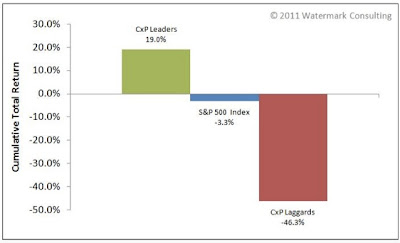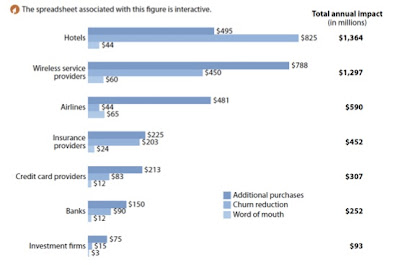Way back in 2011 Watermark Consulting studied S&P 500 companies and found out that those that are perceived to be leaders in providing good customer experiences can achieve up to 20% better profitability compared to the S&P 500 Index at that time. While those companies that do not provide good customer experience lags behind in terms of profitability.
Now compared that with the most recent findings where Cx leaders are performing much better than before.
Similarly Forrester Research quantified that good customer experience can add billions in profitability especially to a typical American company operating Hotels or providing Wireless Services where customer experience is a very important differentiator.
In my previous blog I compared Apple and Samsung, two of the world leading suppliers of mobile devices in this hyper connected and hyper competitive world. Apple of course provide a fanatical level of experience while Samsung is catching up fast. However what if we compare with BlackBerry who used to be defacto leader in supplying Smartphones back when the world is just learning how to be hyper connected as it is today. BlackBerry went from the market leader on Smartphones to near extinction. What went wrong for BlackBerry and what went right for Apple? Way back in 2005 when Blackberry was cool it dominated the enterprise market, those who wants to be connected to their work 24X7. However Blackberry ignored the consumer market which Apple with the release of the first iPhone focused on. In the iPhone it gave you a completely different experience, a good and rewarding experience that even a 2 year child can navigate and use a Smartphone.
The great user experience coupled with great customer service (just visit an Apple retail store to find out) enabled Apple to create a fanatical following anywhere in the world. How much a differentiation is a great customer experience, I would say its worth more than 45B$ per quarter in revenues and more than 10B$ per quarter in profits…. Is that enough to justify why companies should embark on a good customer experience program?
In one of IQPC's Customer Experience event for Telecoms earlier this year M. Agrawal of Optus put together a very good business case financially explaining why a good customer experience program makes the difference in the bottom line. In his example using NPS, by providing a good customer experience and increasing the number of promoters to 10% it will be worth 620M$ to the bottom line of 2 Million subscribers.
The sample above illustrates how some companies benefit from having good Customer Experience as the critical differentiation in their respective domains. If we look back in history we will find out that a lot of the improvements we see today in services provided to us in banking, hotels, restaurant and even transportation services are a product of good customer experience program from some of the pioneers in this field and adopted by most.
More use cases that are not normally published are being shared in conferences, seminars and focused groups such as the ones below...
Now compared that with the most recent findings where Cx leaders are performing much better than before.
Similarly Forrester Research quantified that good customer experience can add billions in profitability especially to a typical American company operating Hotels or providing Wireless Services where customer experience is a very important differentiator.
In my previous blog I compared Apple and Samsung, two of the world leading suppliers of mobile devices in this hyper connected and hyper competitive world. Apple of course provide a fanatical level of experience while Samsung is catching up fast. However what if we compare with BlackBerry who used to be defacto leader in supplying Smartphones back when the world is just learning how to be hyper connected as it is today. BlackBerry went from the market leader on Smartphones to near extinction. What went wrong for BlackBerry and what went right for Apple? Way back in 2005 when Blackberry was cool it dominated the enterprise market, those who wants to be connected to their work 24X7. However Blackberry ignored the consumer market which Apple with the release of the first iPhone focused on. In the iPhone it gave you a completely different experience, a good and rewarding experience that even a 2 year child can navigate and use a Smartphone.
The great user experience coupled with great customer service (just visit an Apple retail store to find out) enabled Apple to create a fanatical following anywhere in the world. How much a differentiation is a great customer experience, I would say its worth more than 45B$ per quarter in revenues and more than 10B$ per quarter in profits…. Is that enough to justify why companies should embark on a good customer experience program?
In one of IQPC's Customer Experience event for Telecoms earlier this year M. Agrawal of Optus put together a very good business case financially explaining why a good customer experience program makes the difference in the bottom line. In his example using NPS, by providing a good customer experience and increasing the number of promoters to 10% it will be worth 620M$ to the bottom line of 2 Million subscribers.
The sample above illustrates how some companies benefit from having good Customer Experience as the critical differentiation in their respective domains. If we look back in history we will find out that a lot of the improvements we see today in services provided to us in banking, hotels, restaurant and even transportation services are a product of good customer experience program from some of the pioneers in this field and adopted by most.
More use cases that are not normally published are being shared in conferences, seminars and focused groups such as the ones below...









